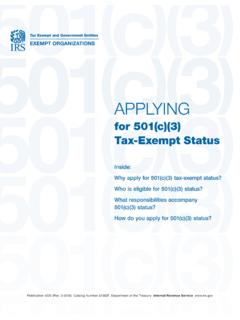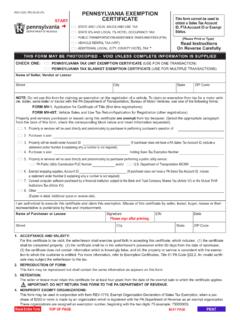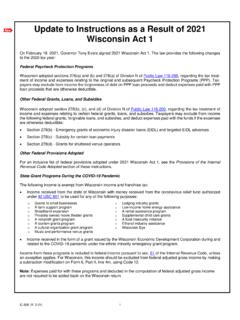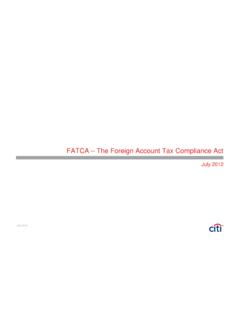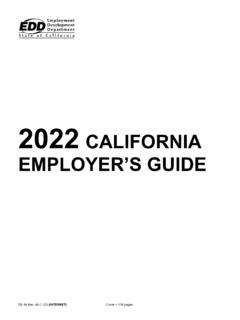Transcription of Tax Exempt and Government Entities EXEMPT …
1 ITax EXEMPT and Government EntitiesEXEMPT ORGANIZATIONS501(a)Compliance Guide for Tax- EXEMPT Organizations,,,(Other than 501(c)(3) Public Charities and Private Foundations),Inside:Activities that may jeopardize EXEMPT status,,Federal information, tax returns or notices that must be filed,,Recordkeeping why, what, when,,Changes to be reported to the IRS,,Required public disclosures,,Resources for tax- EXEMPT organizations,,1 Contents,What Activities May Jeopardize an organization s Tax- EXEMPT Status? ..4,Private Benefit and Inurement, ..4,Political Campaign Activities, ..5,Legislative Activities, ..6,What Federal Information Returns, Tax Returns and Notices Must Be Filed? ..7,Form 990, Return of organization EXEMPT From Income Tax, Form 990-EZ, Short Form Return of organization EXEMPT From Income Tax and Form 990-N, Electronic Notice (e-Postcard) for Tax- EXEMPT Organizations not Required To File Form 990 or 990-EZ.
2 7,Form 990-T, EXEMPT organization Business Income Tax Return, ..10,Employment Tax Returns, ..12,Why Keep Records? ..13,Evaluate Programs, ..13,Monitor Budgetary Results, ..13,Prepare Financial Statements, ..14,Prepare Annual Information and Tax Returns, ..14,Identify Sources of Receipts, ..14,Substantiate Revenues, Expenses and Deductions for Unrelated Business Income Tax (UBIT) Purposes, ..14,What Records Should Be Kept? ..15,Accounting Periods and Methods, ..15,Supporting Documents, ..17,How Long Should Records Be Kept? ..17,Record Retention Periods, ..17,2 Contents (cont d),How Should Changes Be Reported to the IRS? ..18,Reporting Changes on the Annual Information Return, ..18,Determination Letters and Private Letter Ruling Requests, ..18,What Disclosures Are Required? ..19,Public Inspection of Exemption Applications and Annual Returns, ..19,Sale of Free Government Information, ..20,Solicitation Notice.
3 20,Nondeductible Lobbying and Political Expenditures, ..21,Charitable Contributions, ..22,How Do You Get IRS Assistance and Information?, ..23,Specialized Assistance for Tax- EXEMPT Organizations, ..23,Tax Publications for EXEMPT Organizations, ..24,Forms for EXEMPT Organizations, ..24,General IRS Assistance, ..25,Tax- EXEMPT organization Reference Chart, ..26,3501(c)(3)Compliance Guide for Tax- EXEMPT Organizations (Other than 501(c)(3) Public Charities and Private Foundations),Federal tax law provides tax benefits to nonprofit organizations recognized as EXEMPT from federal income tax under section 501(a) of the Internal Revenue Code (the Code). The Code requires that tax- EXEMPT organizations comply with federal tax law to maintain tax- EXEMPT status and avoid this publication, the IRS focuses on organizations that have been granted tax exemption under section 501(a) of the Code other than section 501(c)(3) public charities and private foundations and section 527 political organizations.
4 For information on the compliance requirements of 501(c)(3) public charities and private foundations, see Publications 4221-PC, Compliance Guide for 501(c)(3) Public Charities, and 4221-PF, Compliance Guide for 501(c)(3) Private Foundations. For information on 527 political organizations, see publication addresses activities that could jeopardize a tax- EXEMPT organization s EXEMPT status and identifies general compliance requirements on recordkeeping, reporting, and disclosure for EXEMPT organizations (EOs). Content includes references to the statute, Treasury regulations, IRS publications and IRS forms with instructions. This publication is neither comprehensive nor intended to address every learn more about compliance rules and procedures that apply to organizations that are EXEMPT from federal income tax, see IRS Publication 557, Tax- EXEMPT Status for Your organization , as well as the Life Cycles of Sections 501(c)(3), (4), (5) and (6) Organizations and Information for Other Non-profit Organizations on Stay abreast of new EO information, also on this Web site, by signing up for the EO Update, a free e-newsletter for tax- EXEMPT organizations and practitioners who represent them.
5 For further assistance, consult a tax Activities May Jeopardize an organization s Tax- EXEMPT Status? Once a non-profit organization has completed the application process and has established that it is EXEMPT from federal income tax, the organization s officers, directors, trustees and employees still have ongoing responsibilities. They must ensure that the organization maintains its tax- EXEMPT status and meets its ongoing compliance tax- EXEMPT organization that does not restrict its participation in certain activities and does not absolutely refrain from others, risks failing the operational require-ments for exemption from income tax and jeopardizing its tax- EXEMPT status. The following summarizes certain limitations on the activities of some common types of tax- EXEMPT Benefit and Inurement,Many types of non-501(c)(3) tax- EXEMPT organizations including social welfare organizations, business leagues and trade associations, social clubs, voluntary employees beneficiary associations, cemetery companies, and veterans organ-izations, among others, are prohibited, by statute, from allowing inurement of net earnings or assets of the organization to benefit any insider.
6 An insider is a person who has a personal or private interest in the activities of the organization such as an officer, director, or a key employee. An example of prohibited inurement would include payment of unreasonable compensation to an insider. The types of activities that may be considered to constitute prohibited inurement of earnings may differ from one Code section to another depending on the specified EXEMPT purposes of the organization . Accordingly, an activity that will be considered to result in inurement of earnings to a member of a labor organization may not result in inurement of earnings to a member of an agricultural organization or a social welfare organization because the organizations are organized and operated for different EXEMPT purposes. Go to the Life Cycles of 501(c)(4), (5) and (6) Organizations at for further information about the inurement prohi-bition and providing benefits to members.
7 In any case, inurement may jeopardize an organization s EXEMPT (c)(4) Social Welfare Organizations,In cases where a 501(c)(4) organization provides an excess economic benefit to a person who is in a position to exercise substantial influence over its affairs, the organization has engaged in an excess benefit transaction (see Reporting Excess 5 Benefit Transactions on page 8) that subjects the person to possible excise taxes. Go to the Life Cycle of a 501(c)(4) organization at for details about inurement, private benefit, and excess benefit Campaign Activities,Section 501(c)(4), (5) and (6) organizations may engage in political campaign activities on behalf of or in opposition to candidates for public office. Political campaign activities are those that influence or attempt to influence the selection, nomination, election or appointment of an individual to a federal, state, or local public office. In order to retain its tax- EXEMPT status under section 501(c)(4), (5) or (6), an organization must ensure that its political campaign activities do not constitute the organization s primary a 501(c)(4), (5) or (6) organization s communication explicitly advocates the election or defeat of an individual to public office, the communication is considered political campaign activity.
8 A tax- EXEMPT organization that makes expenditures for political campaign activities shall be subject to tax in an amount equal to its net investment income for the year or the aggregate amount expended on political campaign activities during the year, whichever is a 501(c)(4), (5) or (6) organization takes positions on public policy issues that divide candidates in an election for public office. In these situations, the organization needs to consider all the facts and circumstances of the commu-nication in order to determine whether the expenditure is directed toward campaign intervention or is merely issue advocacy related to the organization s EXEMPT IRS considers the following factors that tend to show an advocacy communi-cation is political campaign activity when evaluating a communication on a public policy issue:n The communication identifies a candidate for public office;n The timing of the communication coincides with an electoral campaign;n The communication targets voters in a particular election;n The communication identifies the candidate s position on the public policy issue that is the subject of the communication.
9 N The position of the candidate on the public policy issue has been raised as distinguishing the candidate from others in the campaign, either in the communication itself or in other public communications; and,n The communication is not part of an ongoing series of substantially similar advocacy communications by the organization on the same that tend to show that an advocacy communication on a public policy issue is not political campaign activity include the following:n The absence of any one or more of the factors listed above;n The communication identifies specific legislation, or a specific event outside the control of the organization , that the organization hopes to influence;n The timing of the communication coincides with a specific event outside the control of the organization that the organization hopes to influence, such as a legislative vote or other major legislative action (for example, a hearing before a legislative committee on the issue that is the subject of the communication);n The communication identifies the candidate solely as a Government official who is in a position to act on the public policy issue in connection with the specific event (such as a legislator who is eligible to vote on the legislation); and,n The communication identifies the candidate solely in the list of key or principal sponsors of the legislation that is the subject of the lieu of using its own funds, a 501(c)(4), (5) or (6) organization may establish a section 527 political organization , called a separate segregated fund, to engage in political campaign activities.
10 Separate segregated funds must give notice to the IRS in order to be tax EXEMPT unless the fund is required to report to the Federal Election Commission as a political committee, it reasonably anticipates that it will always have less than $25,000 in gross receipts for any taxable year or meets one of the other exceptions. Access for additional information about political Activities,In general, section 501(c)(4), 501(c)(5) or 501(c)(6) tax- EXEMPT organizations may engage in an unlimited amount of lobbying ( , attempting to influence legisla-tion), provided that the lobbying is related to the organization s EXEMPT purpose. An organization will be regarded as attempting to influence legislation if it con-tacts, or urges the public to contact, members or employees of a legislative body for purposes of proposing, supporting or opposing legislation, or if the organiza-tion advocates the adoption or rejection of are non-tax related restrictions on lobbying that tax- EXEMPT organizations should be aware of as well.










